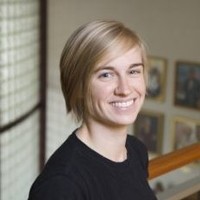Out & Equal exists to help LGBTQ people thrive at work, and to support organizations in creating better workplace culture where everyone feels like they belong. Both of those goals are supported by our partnership with the Korn Ferry Foundation in support of the Leadership U for Humanity program.
“Being an active member of the community to support inclusion is important to me so I can be that role model for others and advocate for meaningful change.”
Maggie Wright, PhD (she/her) is a Senior Scientist at Ultragenyx Pharmaceutical and graduated from Korn Ferry’s Leadership U. for Humanity program in Spring 2022. Dr. Wright has been involved in Ultragenyx’s LGBTQ+ inclusion efforts for 4 years.
What drew you to Leadership U. for Humanity? Why did you decide to enroll?
I was nominated to join the Leadership U for Humanity leadership development program by the head of our company’s LGBTQ+ Employee Resource Group (UltraProud). I was really excited at the opportunity to network with other LGBTQ+ professionals, get access to novel ideas for developing my leadership skills, and have the opportunity to work with a coach to get advice on real situations in my work life.
What was your experience like going through the program?
I’ve really enjoyed the Leadership U series. It’s thoughtfully organized with multiple different opportunities to learn on your own time through their online videos, get direct training from instructors in virtual meetings, as well as bring your own development questions to an insightful and knowledgeable coach. I’ve especially enjoyed the 1:1 coaching sessions and have taken some concrete steps towards improving both my management and communication styles based on feedback from my coach and lessons in the program.
What are some key lessons you’ve taken away from your time with LUFH?
The Listening Lens session was my favorite, and one I continue to work on every day. This session really highlighted for me how important it is to be a truly active and engaged listener, how to come with the perspective of seeking to understand instead of simply to respond. Being more conscious about how I’m receiving and reacting to conversations both in my professional and personal life has been hugely impactful for my ability to fully connect with and understand the perspective of others.
What have you discovered about yourself as a professional throughout the program?
I’ve discovered that while I’m good at responding quickly and being dynamic with my colleagues, sometimes I am better served by being patient and letting things sit for a minute before immediately jumping to respond. Being more thoughtful and deliberate in my communication makes me more efficient and reliable, even though my first impulse is to respond as quickly as possible.
Why is it important for you to be out in the workplace?
It’s so fantastic to be able to bring my whole self to my workplace. Trying to compartmentalize out my queer identity and not speak about my non-heteronormative family would take so much emotional and mental energy. Because I can speak freely about who I am and my family structure, I’m able to focus on my real work.
Why is it important for you to be active in LGBTQ+ inclusion efforts?
I had no queer role models growing up, which for a while prevented me from being able to see a successful future for myself where I could be out. Being an active member of the community to support inclusion is important to me so I can be that role model for others and advocate for meaningful change.
What have you taken away from your organization’s partnership with Out & Equal?
Out & Equal’s yearly conference has been such a fantastic opportunity to learn from ERGs at other companies. We’re all doing this extra work beyond our day jobs and being able to take lessons learned from other ERGs helps us work more efficiently with our limited resources.
What are your long-term career goals?
Like many other people, I’m still figuring out what I want to be when I grow up. I’m looking forward to continuing to build my management and leadership skills to work more strategically on preclinical research projects. I hope to contribute to research that enables the development of life-saving treatments to support as many rare disease patients as possible.
In what ways has being out at work progressed you towards these goals?
Being out at work allows me to be more authentic with my colleagues. When I’m more authentic, I’m more relaxed and able to connect with my teammates in a way that builds trust between us. That trust is a critical and irreplaceable part of being a strong leader of highly effective teams.
What advice do you have for LGBT+ professionals who want to enroll in Leadership U for Humanity?
Do it! Come to sessions with an open mind and a closed calendar; don’t try to multitask it with your day job. Being present at sessions and practicing the strategies frequently with your daily work will help make their advice a habit.
What advice do you have for LGBTQ+ professionals in general?
My advice first and foremost is to find a mentor who is supportive of your identity and career aspirations. As much as our individual abilities and talent can move us forward, you need people to know you and advocate for you to be given access to the opportunities you need to advance. And secondly, take advantage of every opportunity you’re given to showcase your talent. Don’t go so far as to overload yourself with too many obligations, but thoughtfully consider what will give you visibility and a voice.
